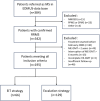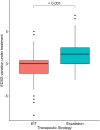Early intensive therapy versus escalation strategy in French Caribbean multiple sclerosis cohort
- PMID: 39887804
- PMCID: PMC11782180
- DOI: 10.1111/ene.70030
Early intensive therapy versus escalation strategy in French Caribbean multiple sclerosis cohort
Abstract
Background: Data on Escalation Therapy versus Early Intensive Therapy (EIT) Strategy in multiple sclerosis (MS) are lacking, particularly in Afro-Caribbean cases, known for their severity.
Objectives: To assess efficacy and safety of these strategies in a predominantly Afro-Caribbean relapsing-remitting MS population.
Methods: A multicenter retrospective study of 195 MS patients, including 66 on EIT, with ≥2 years follow-up.
Primary outcome: Kaplan-Meier curves and log-rank test were used to assess irreversible progression to EDSS scores of 3, 6, and 8.
Secondary outcomes: change in EDSS score, risk factors for EDSS progression, and severe adverse effects.
Results: EIT showed slower EDSS 3 progression than Escalation (median survival 13.5 vs. 9.8 years, p = 0.024). After a median follow-up of 8 years, 89.5% on EIT remained free from EDSS 3 versus 63.8% on Escalation. Univariate analysis linked Escalation (hazard ratio (HR; 95% CI): 2.42 [1.09-5.34]), age at first relapse (HR: 1.04 [1.01-1.06]), incomplete symptom regression (HR: 1.69 [1.02-2.77]), and EDSS 3 progression. EDSS stabilized or decreased with EIT but worsened with Escalation (p < 0.001). Safety profiles were similar.
Conclusions: EIT extends median time to irreversible EDSS 3 in Afro-Caribbean individuals compared to Escalation, supporting its preference as initial treatment.
Keywords: African descent; French Caribbean; disease‐modifying therapies; early intensive therapy; multiple sclerosis.
© 2025 The Author(s). European Journal of Neurology published by John Wiley & Sons Ltd on behalf of European Academy of Neurology.
Conflict of interest statement
The authors report no relevant disclosures.
Figures




References
-
- Olsson T, Barcellos LF, Alfredsson L. Interactions between genetic, lifestyle and environmental risk factors for multiple sclerosis. Nat Rev Neurol. 2017;13:25‐36. - PubMed
-
- Bjornevik K, Cortese M, Healy BC, et al. Longitudinal analysis reveals high prevalence of Epstein‐Barr virus associated with multiple sclerosis. Science. 2022;375:296‐301. - PubMed
Publication types
MeSH terms
LinkOut - more resources
Full Text Sources

